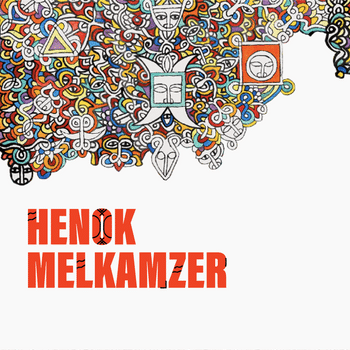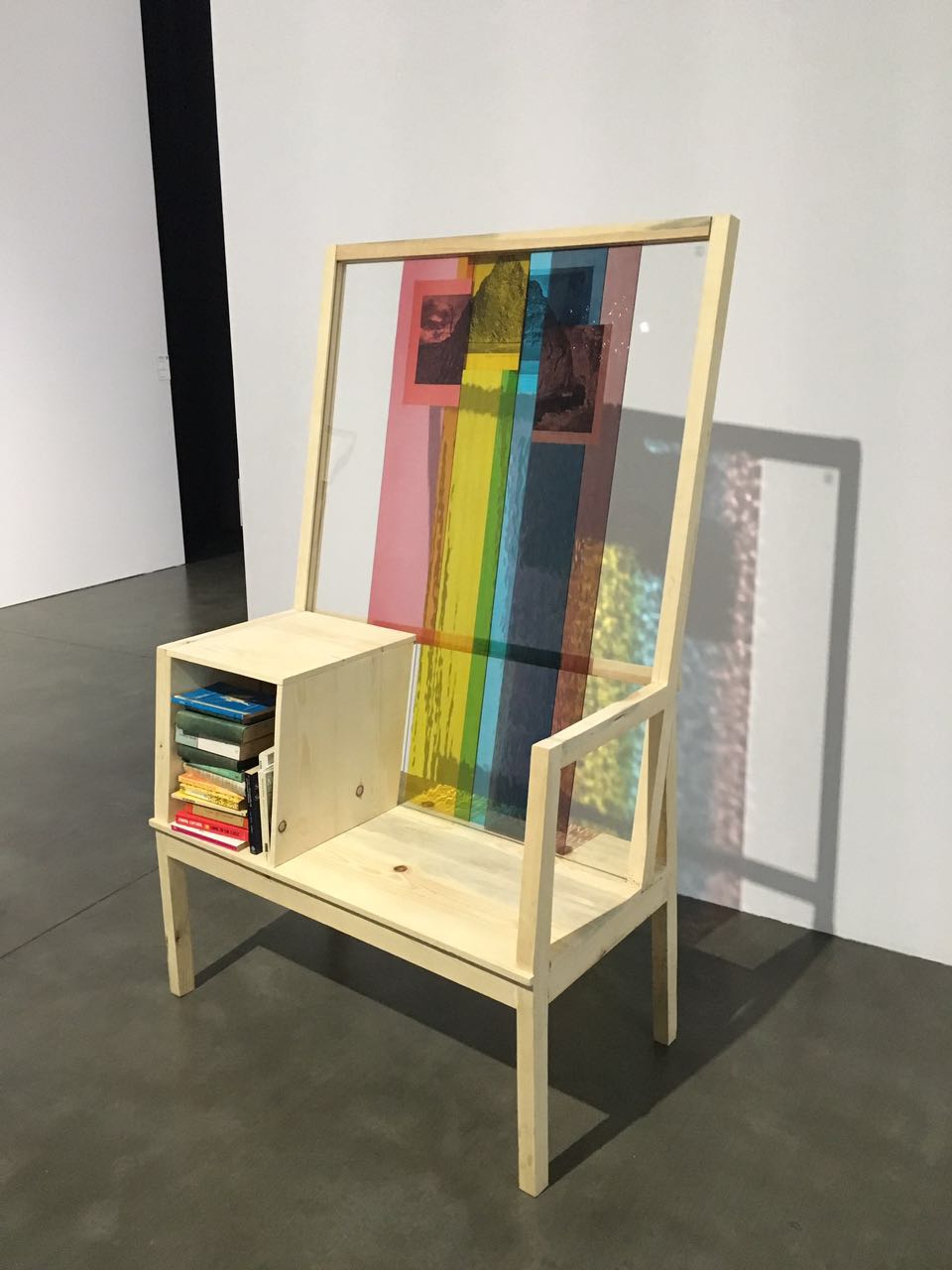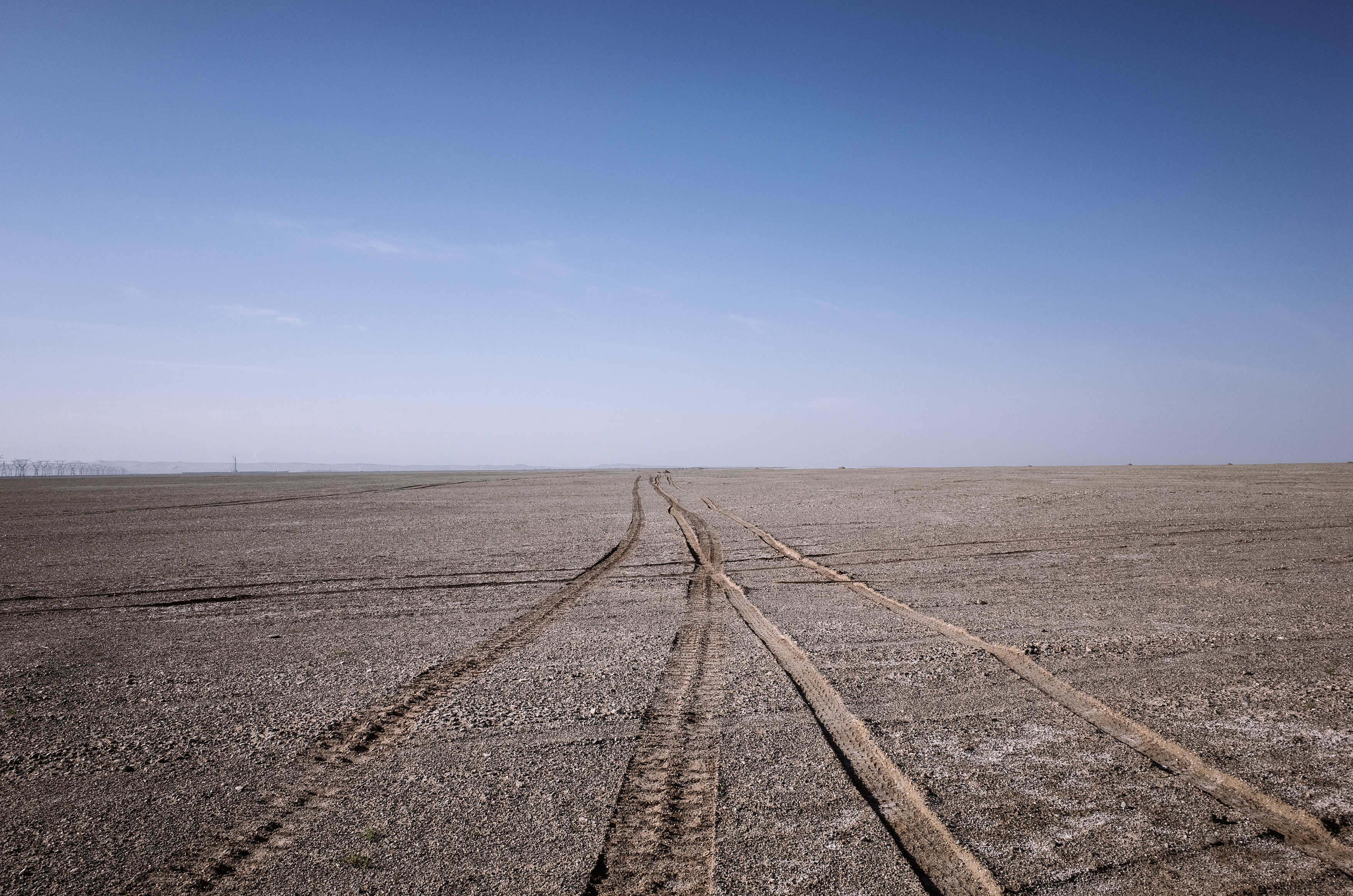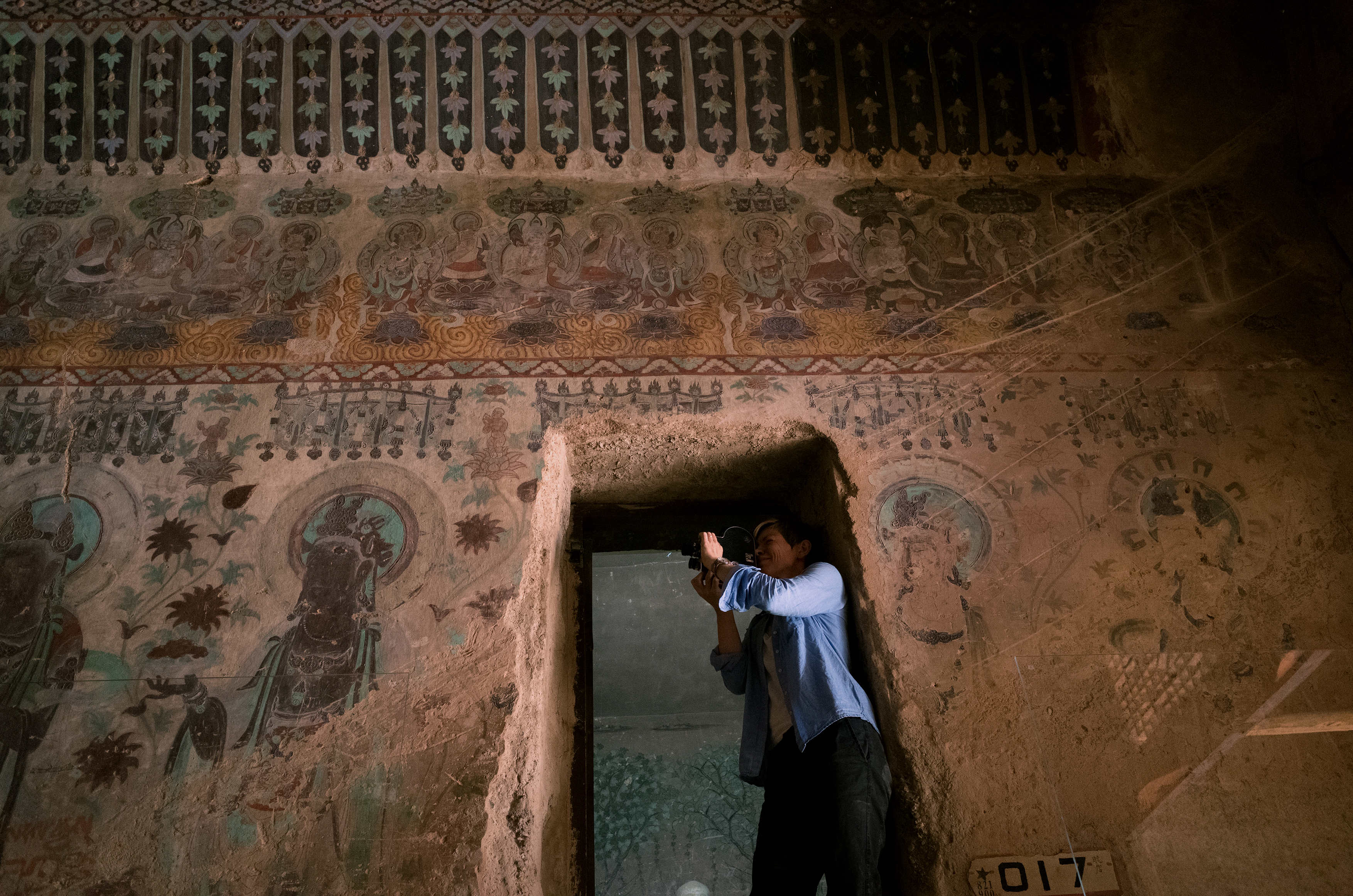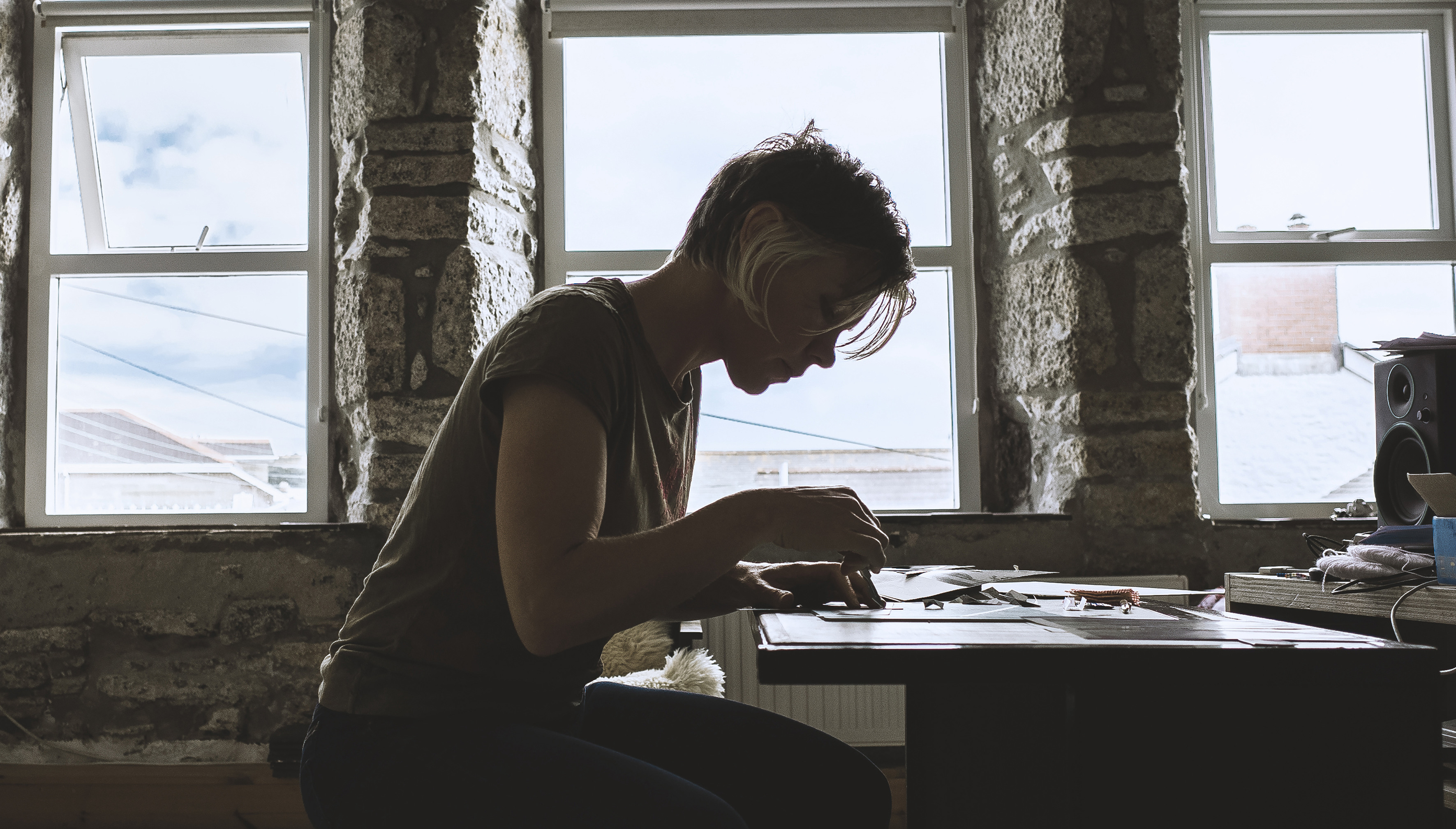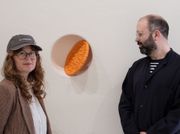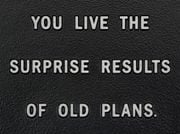Abigail Reynolds
Abigail Reynolds. Courtesy the artist.
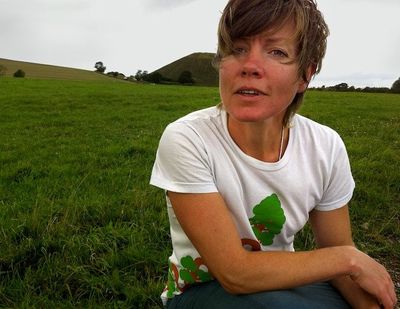
Abigail Reynolds. Courtesy the artist.
It's mid-afternoon in Yinchuan, Ningxia, a city tourist billboards describe as 'an oasis in the hinterlands' of China, approximately a couple of hundred miles from the ghost city of Ordos, Inner Mongolia.
British artist Abigail Reynolds is sitting on a panel for the launch of the inaugural Yinchuan Biennale; she is dressed down in flip-flops and a tie-dyed jumpsuit. She admits to being jet lagged and sun struck, having just spent her first day in China investigating the Baisigou Square Pagoda.
Reynolds is a long way from her home in Cornwall, where her practice typically takes her to book stores and image archives. She manipulates materials such as second hand books and decades old news photographs using techniques found in collage, origami and the parlour game exquisite corpse. Simple visual similarities become emblematic of the half rhymes of history.
Reynolds is here in Yinchuan both for the city's biennale, an improbable event in a place far better known for goji berries than contemporary art, and to conduct an ambitious project: visiting lost libraries along the ancient Silk Road, from Xi'an in the east to Italy in the west. Reynolds will travel to the sites both by air and on the back of motorbikes as part of a BMW Art Journey, an initiative established in 2015 by the German automotive giant in partnership with Art Basel.
Artists are asked to propose a journey, complete it and then reflect on it—implicitly through the creation of new work. Despite her fatigue, and some qualms about the way her works have been installed at the biennale, Reynolds talks excitedly—almost unstoppably—about her project, bringing forth all the enthusiasm for texts lost and found you'd expect from someone who spent three years working as a bibliographical citations assistant for the Oxford English Dictionary.
SGYou've just arrived in China?
ARI flew directly to Yinchuan from Dubai. They lost my bag on the way, which is stressful, because it contains all the books for Magic Mountain (2011–2016); I was told I wasn't allowed to put them in the crate with all the rest of the work because they'd be confiscated for being political. I guess utopias are political.
SGIt's a risk. Everything gets opened. If your magazine subscriptions ever arrive the envelope's always been slit and then taped shut.
ARThey said don't risk it, bring it in your hand luggage, so that got lost on the way. I had a bit of a crazy time. It was a bit of a nightmare. From here I'm going to Xi'an, and from there I go to Dunhuang, and then I need to take three flights to get to Uzbekistan to go to the lost library at Bukhara. I'm a bit worried about my film because it's not meant to get x-rayed.
SGYour paper works often travel between different periods of time, but this lost libraries project requires literal, spatial travel that seems pretty different for you. Had you done something like this before being invited to be part of the BMW Art Journey?
ARNo, and it's such a weird thing because suddenly they say to you, think of a journey. Any journey. And you think oh, okay, and of course it's BMW so I'm not going to suggest taking a bus ride somewhere local. I'm very formal—I use lines a lot. Black Smoker (2015) only works because there's this black column of men in uniform meeting this black column of smoke. I'm constantly searching for lines and connections and the Silk Road is a line that happens to go around three quarters of the world and it connects us to the most ancient, pre-Roman empire. Now the Chinese government really want to promote the Silk Road—there's this Silk Road initiative—so it's also very future looking. I'm not interested in looking at the past just because of the past; I'm interested in these connections heading into the future. That's really how we shape our future, picking up pieces of the past and reshaping them, and the present is this moment that loops backwards and forwards.
Cairo's central library was lost in 2011, and there are libraries being lost right now in Syria. The oldest one is in Xi'an—built in 290 BCE—which was burnt, just as many libraries are, as an act of cultural aggression. It's a very good way to suppress a national identity, a community, and to signal that you are oppressing them. It's always been done like that. All the libraries I'm visiting have different reasons for why they were lost.
The Baisigou [Square] Pagoda that I just went to... what has become interesting to me about it is that different stories are told about why it was lost. The story I heard in Britain, which is why I came here, was that it was blown up by looters in 1990 to look for treasure. But having arrived here that's said to be not true.
I have heard it was destroyed in the Cultural Revolution as a cleansing, but that this story is not told outside China; that it was in fact only excavated in 1990 when there was a move to think about what was destroyed and what might remain. It's been reconstructed and the look of the reconstruction looks to me like the reconstruction is eighties. It's quite hard to say. It's all so opaque! It's sensitive, it's difficult. What is your relationship to history and what do you admit to, and there's a lot of that going on.
The most famous lost library is the [Ancient] Library of Alexandria and it stands as a cipher for the idea of a lost library. They've rebuilt the Alexandria Library and it's stocked with books that are remaindered from European libraries. This was the pinnacle of scholarship for an enormous empire, and now it's just tatty remainders from German libraries. I find it kind of poignant.
I'm using libraries all the time because that's where I get my materials. I used to work for the Oxford University Press on the Oxford English Dictionary. Every word has its entire lifespan tracked through that dictionary, which I think is totally beautiful. Every single word's meaning, as it goes through time, is supported by a quote taken from a book and my job was to check that it was really there. I'd get a list of quotes—and I did pre-1530s—let's say it's a work by Chaucer, and my job was to check.
There would be a folio number or some mark and my job was to call the book, which you can open with your bare hands at Oxford. You don't have to wear gloves or anything. My job was to find the page, check that the word was there and how it was spelt. And if it wasn't there, my job was to read the whole book to find it. It's actually such a head fuck. You can't read for sense because you're looking for a pattern. Once you read for the sense you stop looking for the fragment.
There are many ways of reading. The way you read a map isn't the way you read a human face.
I'm constantly searching for lines and connections and the Silk Road is a line that happens to go around three quarters of the world and it connects us to the most ancient, pre-Roman empire. Now the Chinese government really want to promote the Silk Road—there's this Silk Road initiative—so it's also very future looking.
SGThere's this forensic quality that connects that work with this project, but the methodologies of the two types of detective work are very different.
ARI spend a lot of time focusing tightly on book pages and the context of an individual image. I'm a scalpel user. Everything I do is very precise. I just thought this was a time to flip it over and enter into the darkness. The libraries are a kind of enlightenment but if they're destroyed they become shadows.
SGI'm curious about your ideas on this because your works with book pages are acts of creation but they necessitate the destruction of texts, something people feel almost superstitiously against. Are the books you use in your work usually decommissioned from libraries?
ARSome of them are, but I get them by going to second hand bookshops. Black Smoker (2015) I made at The Guardian News & Media Archive. The Guardian have a print archive which they will never digitise, and it's alphabetised. Each image is given a label, and it means that in a box there's 'accidents', 'angels', 'acupuncture', 'architecture', 'archaeology', and 'au pairs'. So if you search Greenham Common Women's Peace Camp, a moment in history that really fascinated me, 'Greenham Common' might be under g for green, p for protest, d for demonstration, w for women, f for feminism. How do you classify the world?
There weren't many images but it took me into this other world of thinking about cataloguing. Every library along the Silk Road is catalogued differently, which tells you a lot about how the world is seen. All of this stuff is so huge, the timespans are huge, the distances are huge, but also the concepts are huge. How do we catalogue human experience and what we know? What we preserve and what we don't? I'm really interested to see what I'm going to make that will honor the complexity of this.
SGOf course you can search using an image as an input now too.
ARI think I did it once and it was so strange that I didn't do it again.
SGIn the digital sphere there's also information being destroyed almost the instant it's produced—social media posts, for instance, that are being censored. In a way the Internet seems like a great way to preserve information, cheaply, efficiently, but in another way it's very, very easy to destroy it, finding and obliterating everything that uses a forbidden term.
ARA book is, in a way, incredibly hardy, whereas a digital file can corrupt and then we change the technology and we can't read this disk from the eighties, or whatever. I don't really deal with the digital. I've thought, every now and again, I'm just going to rage out into the Internet and use those images but I really hate them. They're really shitty. They don't have any depth.
SGThere's something so unsatisfying about them, but I find that challenging because there's so much creative energy in terms of what people are making and sharing online, but at the same time the results feel ethereal and ephemeral.
ARIt's kind of junky. The deluge that is the Internet is kind of like being vomited on because it's completely regurgitated. It's hard to search it meaningfully for structure. I often work with images of destruction like in Black Smoker (2015), fires or protests. I'm very drawn to that kind of imagery and actually that's very easy to find on the Internet—houses that have collapsed—but once it becomes digital it becomes kind of flattened. Maybe I lose the feeling of serendipity with the digital. I happen to be here, I happen to have this book and it's a very personal thing. If it's the screen it's like standing under a waterfall and needing an umbrella. I find it hard with those kinds of images to make an incision. It's like if you poked it your hand would go through.
SGThe process of working with digital materials is also completely different. You'd be living your life on Google Chrome and in Photoshop. It starts to look a lot like an office job.
ARYou become a content manager. I'm a big fan of materiality. With the libraries I'm using 16mm film, and it's not to do with nostalgia. It's because it's a material, and books are a material, and there's the indexicality of film where the real light is really there and the actual dust is really actually hitting a piece of film. That's also what galleries are really good for; it's a physical experience.
I'm using libraries all the time because that's where I get my materials. I used to work for the Oxford University Press on the Oxford English Dictionary. Every word has its entire lifespan tracked through that dictionary, which I think is totally beautiful.
SGI had a weird, deranged, maniacal dream of recreating your trip with a submarine and following the undersea Internet cables around the world to see where they go. It's a kind of contemporary Silk Road.
ARDo you know where they come out in the UK? They come out where I live in Porthcurno Beach. You can see the cables come in.
SGYou should quit being an artist and start doing rapid-fire trades using some kind of smart algorithm. Are there people there doing trades?
ARNo. Cornwall is one of the most marginal areas in the UK. There are no jobs. There are a lot of pagans, witches and lesbians there, but there's no work. Everyone does everything not by trading but by tradeoffs, exchanges, barter. There's so little money there and yet we still voted Brexit even though the only money there was EU money, but let's not talk about it because it depresses me.
SGIt's political, but your work is political. The photos you choose are political.
ARThey are. I care about that stuff. I'm a big fan of the NHS. Of course we should have that. Of course we should have libraries. Of course we should support each other, otherwise what's the point? Where I live in Cornwall because it's uncommercial and because there's nothing there, it fosters a much greater sense of community and self entertainment. I'm like a mid-century person who really thinks it was right and I find the dismantling of that stuff really shocking.
SGI wanted to ask you about motorbikes.
ARThat's to do with being physical. That's because I like physicality and I don't want to let go of it. I live in St Justin, it's half an hour to St Ives, which is where my studio is, and you cannot park in St Ives because it's a very quaint, tourist town. I got a motorbike in this utilitarian way because I needed to get to my studio and I love it!
When you're used to riding a motorbike a car feels so bovine. You can pull a bike over anywhere. You're so small. And speed... it's like cutting through some of the shit, that's how I feel about it.
SGWhen did you learn to ride a motorbike?
ARThree years ago.
SGAnd now you're riding up and down the Silk Road?
ARYeah, but you know. I find it really difficult to work with organisations. I'm an artist. I don't have a boss. I don't work well within other people's structures because I find them constraining. When I'm on my motorbike in Cornwall—I'm a mother, I've got two small children—they don't come on my motorbike because that would be dangerous, so it's a little cipher for my freedom and my creative freedom as well. I want to do this my way and I want to do it in a way that I don't feel that constraint strongly.
If you're on a motorbike, you're kind of indeterminate. You're not easily identifiable when you've got a crash helmet on. People don't know who you are and what your business is and how old you are. You can move through in a different way and that's all I like doing. I like trespassing a bit. I like doing things in a way you're not meant to do it. On a motorbike I can go where I want to go, not where I said I'd go or someone wanted me to go.
Yesterday they got me a motorbike: a Yangtze River model, a BMW copy, and it's a 1930s war torn bike with a sidecar. The man who owns it was really worried about me driving it so he wouldn't let me until we got out of the traffic. He didn't believe I was going to be able to ride this thing and when I changed gear he was so happy.
Turns out this guy makes his living doing up these war time bikes, which actually have gun turrets on them and selling them on. I'm not using one of the gun turret ones. His other job is he's a wedding photographer.
SGThey're not giving you a slick new BMW?
ARThey can't source one in China. I don't know why.
Maybe I lose the feeling of serendipity with the digital. I happen to be here, I happen to have this book and it's a very personal thing. If it's the screen it's like standing under a waterfall and needing an umbrella. I find it hard with those kinds of images to make an incision. It's like if you poked it your hand would go through.
SGHave you thought about motorbikes in other art projects? There's a novel by Rachel Kushner called The Flamethrowers about a woman who races a bike across salt flats and photographs her trails as a kind of land art. And Simon Starling built a hydrogen-powered bike and used the water it emitted to paint a water colour of a cactus.
ARYes, but that wasn't a motorbike, it was a funny kind of bicycle. It was like an electric bicycle. I really love his work. It's like an adapted push bike. He's kind of hokey like that.
SGThere must be places you won't be able to get to along the Silk Road.
ARYou can't move anywhere between Egypt and Iran, so I'm hopping over that conflict zone. I was in the studio and I heard a story on Radio 4 about Palmyra and its destruction again. They were talking about ISIS destroying monuments across Syria and the loss of those artifacts. And then there was another story about a group of academics who are petitioning the Italian government to continue to excavate a library at Herculaneum that was buried by Vesuvius. Suddenly, with these two stories that were both very current, I just thought that's it.
The reason they want to excavate the library in Herculaneum is that all the Roman libraries had Greek and Latin sections, divided into different rooms, always. They made this excavation in the 1750s and 1760s because they realised that there was some buried villa—it's called the Villa of the Papyri. They dug this huge shaft like a skyscraper through the volcanic ash that had amounted and at the bottom they arrived at this room full of what they thought were chunks of charcoal but then they realised that they were carbonised scrolls.
They tried to unravel them and peace them together and in the 90s they found a way to use multi-spectral imaging so they don't have to unroll them; it's not perfect but they should be able to read them because the ink should have certain chemicals in it. They only found one room, the Latin section, which means the Greek section is still there, and they believe that all of the Greek tragedies are in it. We only have a tiny proportion of the plays of the Greeks. It's a tantalising possibility to recover this lost thing.
The reason one of the libraries in Turkey, the Library of Pergamum, was destroyed is that when Julius Caesar burnt Alexandria down, Cleopatra was upset—this is meant to be true, but it all becomes very fabulous—and somebody went to the Library of Pergamum and took the entire contents forcibly and sent it to Alexandria, which promptly burnt down again.
There's just wonderful, wonderful narratives that have this great resonance. Even if there's no way to make a work that says anything about this, I find it really meaningful and important to think about. I'm happy that I get facilitated by BMW to go to these places, but actually I also like the absurdity of it because what I'm doing is traveling at huge expense, distance and difficulty to sites that are voids—that are blanks, but that somehow feels really good to me.
SGThough they momentarily cease to be voids then in that moment of acknowledgement.
ARThat's really nice. I hadn't thought about that, but yes. —[O]


